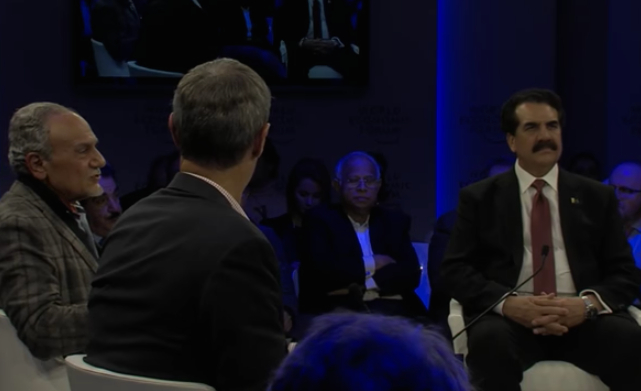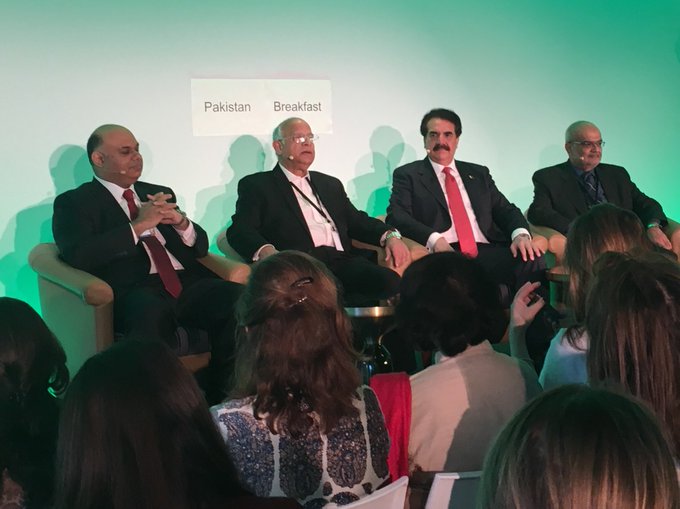The PAKISTAN BREAKFAST in Davos during the World Economic Forum’s (WEF) Annual Meetings since 2002 is now known as the traditional PAKISTAN BREAKFAST. The President of Pakistan, the Prime Minister or a prominent Pakistani personality is usually the Chief Guest. Graced by PM Mian Nawaz Sharif in 2016, Arif Naqvi of Abraaj, hosted a well-attended Dinner instead with good speakers and tremendous Pakistani food on Wednesday 18 Jan evening.
Gen (Retd) Raheel Sharif was the PATHFINDER Chief Guest the next morning. He focussed on how the security situation was controlled with enormous sacrifices by both Pakistani soldiers and civilians. This allowed the China-Pakistan Economic Corridor (CPEC) to become an economically feasible reality, a game-changer for Pakistan and for the region. The audience joined the panelists in vocally acclaiming the former Army Chiefs steely campaign against terrorism and the unique relationship he has with the people of Pakistan. Within the Congress Centre he was stopped repeatedly by the elite wanting to shake his hands.
Among the guests at the PAKISTAN BREAKFAST were Henry Ross Perot Jr, Chairman of the Perot Companies, Dr. Urs Lustenberger, President of the Executive Board, Swiss-Asian Chambers of Commerce, Switzerland, Daisy Guo Xiaoqian, Co-founder and Chief Operations Officer, Tezign.com China, HH Shaikh Salman Al Khalifa, Honorary Chairman, The Bahrain Petroleum Co,. Elizabeth G Weymouth, Senior Associate Editor, The Washington Post, Jerry Torres Chief Executive Officer, Torres AES, Francis Matthew from Gulf News and a host of others, more than 200 packed into the SALON ATLANTIS (Room for 150 only) of the STEIGENBERGER BELVEDERE at 7 am in the morning. From Pakistan Hussain Dawood, Group Chairman, Dawood Hercules Corporation Ltd, M. Javed Akhai Chairman Martin Dow Ltd, Sharmeen Obaid Chinoy, Faisal Basheer CEO UBL Switzerland AG, etc.
Raheel Sharif had a number of high profile security-related interactive sessions in Davos, The Global Security Context’ was moderated by Robin Niblett Director of Chatham House with Victor L. L. Chu, Chairman and Chief Executive Officer, First Eastern Investment Group, Hong Kong SAR, Turki Al Faisal Al Saud, Chairman, King Faisal Center for Research and Islamic Studies, Saudi Arabia. Ursula von der Leyen, Federal Minister of Defence of Germany and George Yeo, Visiting Scholar, Lee Kuan Yew School of Public Policy, National University of Singapore, Singapore as Panelists. Revolving around the noteworthy changes and emerging trends reshaping the international security agenda, dimensions addressed were (1) Recalibration of US security priorities (2) Geostrategic shifts and (3) Future conflict domains. Gen Sharif’s next session entitled ‘Terrorism in the Digital Age” was moderated by Louise Richardson, Vice-Chancellor, and University of Oxford, United Kingdom. Gen Raheel Sharif was joined by Jean Paul Laborde, Assistant Secretary General and Executive Director, Counter-Terrorism Committee Executive Directorate, United Nations, New York, Turki Al Faisal Al Saud, Chairman and Rob Wainwright, Director, Europol (European Police Office), The Hague. Pakistan’s successful fight against terrorism was repeatedly acclaimed by all the panelists, most questions from the audience were directed at Raheel Sharif.
Shekhar Gupta, formerly of Indian Express, asked the former COAS pointedly the Indian narrative about how Pakistan could kill “snakes” in the front yard while harboring them in the backyard, Raheel Sharif said the Army did not differentiate between killing snakes, whatever hue and colour they were and wherever they were, including “those in the adjoining region”. He said non-state actors (NSAs) play a role in accelerating tensions between nations, especially neighbours. Any spectacular attack with linkages to one country can cause huge problems. It is important to resolve the core issues of Kashmir and Palestine.

The former COAS said that terror ism was a dangerous phenomenon as terrorists can morph and mutate quickly. Bound by protocols, human rights and diplomatic issues we lack cohesive measures while terrorists recognize no boundaries and their attacks are well planned. They now have proxies where small groups carry out suicide bombings, etc. on the bidding of larger groups. As counter measures we must have comprehensive response against financers, abettors and sympathizers. Intelligence sharing was the key to success with quick response initiated on action able intelligence. Leading nations must develop protocols, counter narrative and counter-measures, UNHCR Resolution 1373 clearly outlines responsibility of all nations as it is a common obligation i.e. pre vent movement of terrorists, early warning to other states, deny safe havens to those who finance, plan or cooperate with them.
Gen Raheel elucidated some steps that can be taken, ‘viz (1) educate youth, radicals to be de-radicalized and taught skills to become member of society, (2) develop programs to go side by side with kinetic programme, (3) punish hardcore terrorists who are beyond de radicalization, (4) follow up after every violent incident instead of waiting for the next one and (5) the free world must go on a “surge” to fight terrorism on all fronts and dimensions. He said that terrorism in the digital age has software and hard-ware part, the developed world lacks the software to deter terrorists i.e. developing global norms by consensus and finding acceptable political solutions acceptable to all parties.
Gen Raheel said that he saw more decentralization as “we have not been able to control the spread, ideological or kinetic” as hardcore terrorists returning to their home countries can act as breeding grounds. The cyber threat is not to be seen as ‘one size fit air because developing countries rely less on cyber technology, as opposed to the developed ones, however their military infrastructure, banking sector, air travel, etc. are critical infrastructure and at risk. In the future educated persons will pose bigger challenge than uneducated derailed suicide bombers Crackdown on financiers and facilitators is key to success alongwith religious counter narrative. While technological advancements have created new vulnerabilities for the States and new opportunities for non-state actors (NSAs), the technologically advanced countries have greater capability of promoting and protecting their interests as compared to the developing world.
Gen Raheel was impressive in Davos, he exuded confidence and a charisma not felt by Pakistanis at Davos for a long time. His presence in Davos gave out a strong message about Pakistan’s positive image and stance on terrorism. Not being privy to the subject matter of the PM’s bilateral meetings, one cannot comment on them. The former COAS emphasized that his successor Gen Qamar Javed Bajwa, would maintain the momentum against terrorism, he was confident he would vastly improve upon it. Davos-ians are a hard-bitten cynical lot, certainly not naïve or gullible so their spontaneous applause was extremely satisfying. Not supported by a vast delegation with full-fledged logistics support, Raheel Sharif with only one person accompanying him, did Pakistan and the Pakistan Army proud at Davos.




